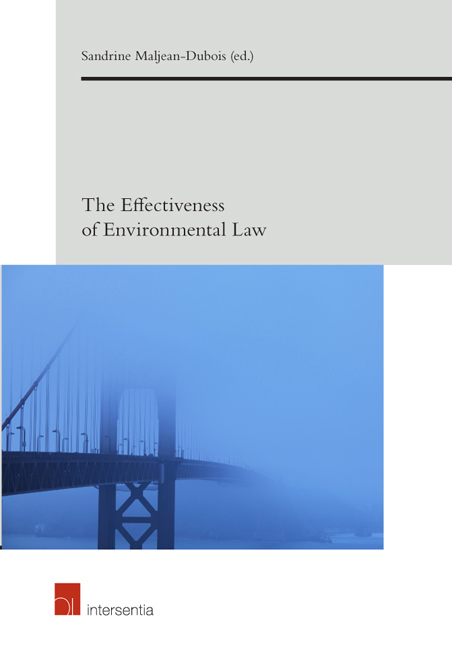Introduction. The Effectiveness of Environmental Law: A Key Topic
Published online by Cambridge University Press: 27 September 2018
Summary
Over the last five decades, there has been a rapid expansion in the use of law in the service of the environment. We now have a collection of legal instruments aimed at protecting the environment, at the international, regional, national and subnational levels, ranging from treaties to national legislations, from constitutional provisions to municipal regulations, from hard to soft law. There is certainly a breath-taking number of instruments today, as well as a variety of protected domains.
However, this impressive development in environmental law has not always been matched by corresponding improvements in environmental quality. The threats to our environment and, by extension, to our health have never been so numerous or serious. Ecosystems and natural resources are declining at an alarming rate. Yet, climate change is a reality. Environmental degradation is an ever-growing challenge. These threats jeopardize our children's future, and subsequent generations’ futures, because of their long-term consequences, not to mention their irreversibility. Without sounding overly melodramatic, we must recognize that this is now a question of our very survival.
Indeed, if successive environmental reports are to be given any credence, there is a steady decline in environmental quality, bringing into sharp focus questions relating to implementation, as well as questions related to the true value of the existing instruments. In brief, it gives rise to some questions about legal effectiveness.
For this brief and modest introduction to a very rich conference topic, I will first underline that effectiveness has been a long-neglected issue. Secondly, I will try to define what is a polysemic term. Thirdly, I will remind the reader of the difficulties involved in assessing effectiveness. Lastly, I will try to identify some avenues by which to improve the effectiveness of environmental law.
THE EFFECTIVENESS OF ENVIRONMENTAL LAW: A LONG-NEGLECTED ISSUE
In the early years of environmental law – from the 1970s to the 1990s – a time characterized by “normative frenzy,” the stress was primarily put on constructing a body of regulations aimed at environmental protection. As this body of regulations attained critical mass, academics and practitioners turned the spotlight on the causes for the relative ineffectiveness of a lot of instruments that had been adopted and the means by which to remedy it.
- Type
- Chapter
- Information
- The Effectiveness of Environmental Law , pp. 1 - 12Publisher: IntersentiaPrint publication year: 2017



